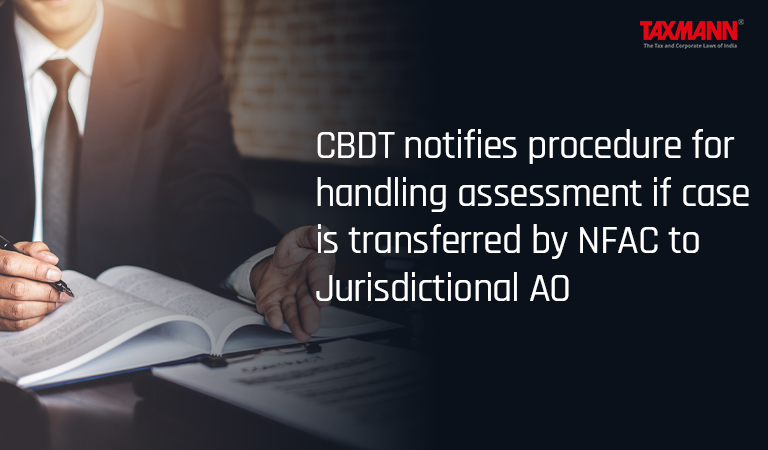CBDT notifies procedure for handling assessment if case is transferred by NFAC to Jurisdictional AO
- Blog|News|Income Tax|
- 2 Min Read
- By Taxmann
- |
- Last Updated on 8 September, 2021

Notification F. No. 225/97/2021/ITA-II, dated 06-09-2021
Section 144B(8) empowers the Principal Chief Commissioner or the Principal Director General in charge of the National Faceless Assessment Centre (NFAC) to transfer the case to the Assessing Officer (AO) having jurisdiction over such case, with the prior approval of the CBDT. Similarly, Clause 5(2) of the Faceless Penalty Scheme, 2021, has empowered the Principal Chief Commissioner or the Principal Director General, in charge of the National Faceless Penalty Centre, to transfer penalty proceedings to the income-tax authority or the National Faceless Assessment Centre having jurisdiction over the assessee or any other person, in whose case the penalty proceedings are initiated, with the prior approval of the CBDT.
Now, the CBDT has prescribed the following procedure for handling of assessment by Jurisdictional AO in respect of such transferred cases:
(a) All processes in transferred cases may be conducted electronically to the extent technically feasible, except in those cases where the assessee does not have an e-filing account/registered e-mail to communicate electronically with Jurisdictional AO. For cases without digital footprint, the Jurisdictional AO shall endeavour to get the e-filing account of the assessee registered and then electronically conduct the proceedings;
(b) The request for personal hearings shall generally be allowed to assessee with the approval of Range Head, mainly after assessee has filed written submission to the show cause notice. The personal hearing may be allowed to assessee preferably through Video Conference. If Video Conference is not technically feasible, personal hearings may be conducted in a designated area in Income Tax Offices. The hearing proceedings may be recorded;
(c) Use of Faceless processes such as Verification Unit for online verification, Technical Unit for Technical inputs, etc. may also be considered for the non-faceless regime to the extent technically feasible;
(d) To have consistency with the unit concept in a faceless regime, the Range Head may compulsorily be involved in the finalization of assessment of such cases transferred to Jurisdictional AO, for which the provisions of Section 144A may suitably be invoked. In penalties, the approval of Range Head is already embedded in Section 274(2), over a specific monetary ceiling of ‘penalty imposable’. The same may be adhered to.
It is also clarified that in respect of such transferred cases, Jurisdictional AO shall consider the proceedings conducted so far under the faceless regime and proceed further as per the provisions of the Act and broad contours of modalities as indicated above.
Click Here to Read the Full Circular
Disclaimer: The content/information published on the website is only for general information of the user and shall not be construed as legal advice. While the Taxmann has exercised reasonable efforts to ensure the veracity of information/content published, Taxmann shall be under no liability in any manner whatsoever for incorrect information, if any.

Taxmann Publications has a dedicated in-house Research & Editorial Team. This team consists of a team of Chartered Accountants, Company Secretaries, and Lawyers. This team works under the guidance and supervision of editor-in-chief Mr Rakesh Bhargava.
The Research and Editorial Team is responsible for developing reliable and accurate content for the readers. The team follows the six-sigma approach to achieve the benchmark of zero error in its publications and research platforms. The team ensures that the following publication guidelines are thoroughly followed while developing the content:
- The statutory material is obtained only from the authorized and reliable sources
- All the latest developments in the judicial and legislative fields are covered
- Prepare the analytical write-ups on current, controversial, and important issues to help the readers to understand the concept and its implications
- Every content published by Taxmann is complete, accurate and lucid
- All evidence-based statements are supported with proper reference to Section, Circular No., Notification No. or citations
- The golden rules of grammar, style and consistency are thoroughly followed
- Font and size that’s easy to read and remain consistent across all imprint and digital publications are applied



 CA | CS | CMA
CA | CS | CMA

One thought on “CBDT notifies procedure for handling assessment if case is transferred by NFAC to Jurisdictional AO”